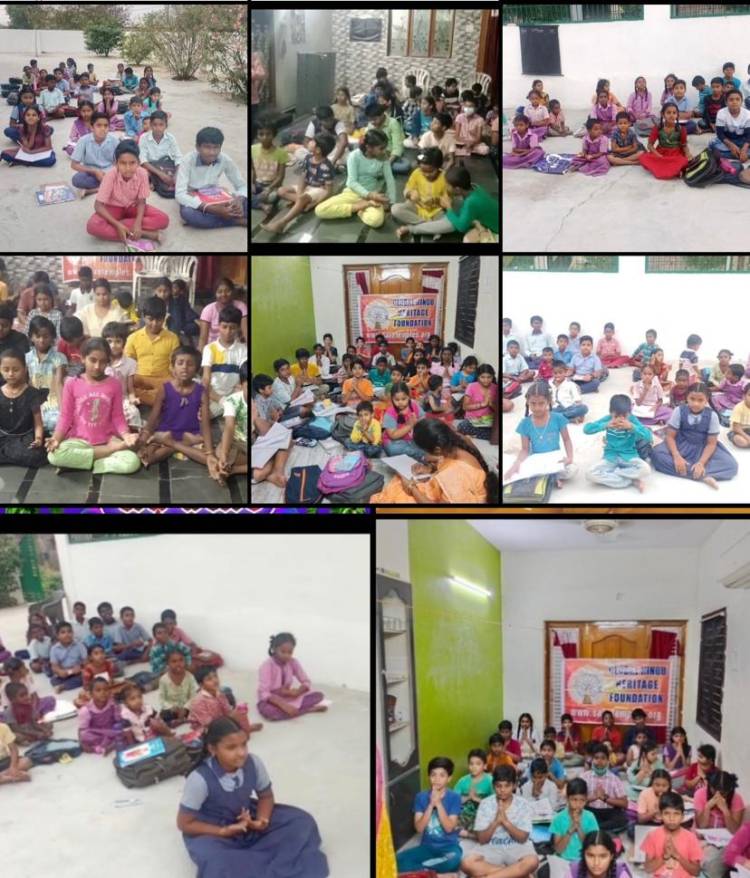[GHHF] Bala Samskar Kendras – Students learned from Vemana’s Poem the virtue that distinguishes Salt and Camphor although both are white.
 John Campbell Oman (1841 - 1911) Professor of Natural Sciences at Government College Lahore.
John Campbell Oman (1841 - 1911) Professor of Natural Sciences at Government College Lahore.
The existence of sadhus, was "no recent importation, no modern excrescence, but has been flourishing in India, a veritable indigenous growth, from a time which dates many centuries before the advent of Christ, or even the preaching by Buddha of the eightfold path leading to enlightenment and deliverance . . ."
Global Hindu Heritage Foundation is very happy to inform you that we have started Bala Samskar Kendras (Schools for children and youth) to enrich them with the greatness of Hindu Dharma and appreciate the sacrifices many leaders have done to protect Bharat. There are many kings who have achieved new heights in their skills, talents, and strength. Unfortunately, Bharath denies its history to its own children and glorified the most undeserving rulers. The government has corrupted the minds of young students since Independence from 1947.
Vemana’s Poem
Vemana is the pen name of the Telugu-language poet, singer, and philosopher Kumaragiri Vema Reddy. He was born in 1530 to a Brahmin family in what is now known as Annavaram, near Kakinada, Andhra Pradesh. Vemana's poems are written in fluent Telugu with heavy usage of vernaculars. This has made the poems difficult to translate into any other language.
His poems are deep and meaningful and he uses metaphors and similes in his work. Some of Vemana's most famous poems are "Kamsa", "Tirukkurraluve", "Ammi Thalluni Akka Akka" and "Ola ikku."
Teachers selected the following poem to talk about the quality of virtue:
- Uppu Kappurambu nokka polika nundu
Chooda chooda ruchulu jaada veru
Purushulandu Punya purushulu veraya
Viswadhaabhiraama, Vinura Vema
(English Translation)
Salt and camphor look similar,
but closer observation shows their taste is different
Among men, virtuous people stand apart
Beloved of the Bounteous, Vema, listen!
“Virtues" are attitudes, dispositions, or character traits that enable us to be and to act in ways that develop this potential. They enable us to pursue the ideals we have adopted. Honesty, courage, compassion, generosity, fidelity, integrity, fairness, self-control, and prudence are all examples of virtues.
Honesty, courage, compassion, generosity, fidelity, integrity, fairness, self-control, and prudence are all examples of virtues.
The qualities of virtues are explained in Parashara Smriti: "Assiduous work, the bridling of the passions, compassion, liberality, truthfulness, . . . discipline, generosity, righteousness, . . . [and] wisdom. . . ." This dharmic virtue ethics is further explained by the development of character traits by which a person's virtues can be known. In the Vana Parva of the Mahabharata King Nahusha asks Yudhishtira what dharma is, and he defines it as the virtues of truthfulness, generosity, forgiveness, goodness, kindness, self-control, and compassion.[20] Going completely against caste determinism, Yudhishtira contends that Indra having these qualities would actually be a brahmin, and if a brahmin lacks them he would be Indra.
The Bhagavad Gita celebrates the single virtue of self-control as holding the key to moral and ethical conduct and considers that person as “illumined” who can still have the senses by controlling the mind. “A man may renounce physical actions but if his mind still dwells on objects of his sensual desire, he is deceiving himself and is hypocritical. But he who controls the senses by the power of his will is to be admired. His actions are disinterested and are directed towards union with the Brahman. … Just as winds turn the ship from its course in the stormy waters, the senses sway man’s mind adrift and distort his sane judgment from its course.”
DONATIONS
PayPal Method: To donate visit our website: savetemples.org. Click on the Donate button, then press the Purpose category, and select the General Donation category.
By Check: Or you can send a check payable to: GHHF, It is tax-deductible.
By Zelle: ghhfusaorg@gmail.com
By Rupees, please contact us by either phone or email.
For more information, call Prakasarao V Velagapudi 601-918-7111 ; Email: ghhfusaorg@gmail.com



















 Urgent support needed for Bangladesh Hindus
Urgent support needed for Bangladesh Hindus  HINDU VIVAH USA - 2024
Nov 30, 2024 @ 2:00 - 5:00 PM, Irving, USA
HINDU VIVAH USA - 2024
Nov 30, 2024 @ 2:00 - 5:00 PM, Irving, USA 







